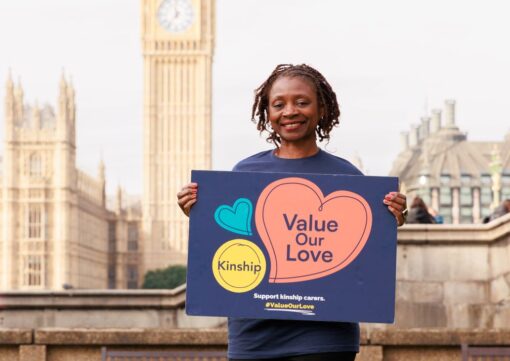Kinship care statutory guidance – what’s new?
29 October 2024
Kinship Care Week 2024 brought with it a number of announcements of relevance to kinship care policy and practice in England, including the publication of updated statutory guidance. But what exactly is new, and what does it all mean?
On this page
Click on the link below to take you to the section you'd like to read:
Introduction
On Friday 11 October, towards the end of Kinship Care Week 2024, the Department for Education published new kinship care statutory guidance for local authorities in England. This sets out how local authorities should support children who are cared for by extended family, friends, or connected individuals.
Delivering new statutory guidance was one of the commitments made by the previous Government in December 2023 when it published the first ever National Kinship Care Strategy, but publication was delayed as a result of the General Election. As such, we’re pleased to see the new Government maintain the momentum following the Strategy and deliver new guidance within its first 100 days, as called for by our #ValueOurLove campaign.
This is particularly welcome given the previous Family and Friends Care guidance hadn’t been updated since 2011 and didn’t reflect the current policy context for kinship care, nor its place as a fundamental pillar within the new Children’s Social Care National Framework.
New guidance helpfully reinforces to local authorities that support shouldn’t be allocated solely on the basis of the child’s legal status, nor should a child have to become looked after to enable them or their kinship carers to access financial, practical or other support.
This is crucial and something we have pushed for the new guidance to make explicitly clear given our evidence – and that from surveys of local authority practice – which reveal the hierarchy of support for kinship families based on type of arrangement and the child’s journey into kinship care.
However, the Government is clear that the new guidance “does not place any new statutory requirements on local authorities” but instead “repositions previous guidance into a clear framework supported by updated factual information and legal guidance”. Much of the content remains identical to its previous iteration and opportunities were missed to consider how the guidance could really drive forward practice improvements within local authorities.
Kinship carers need more than just updated guidance. That’s why Kinship’s #ValueOurLove campaign will continue to push the new Government to introduce legislation which delivers the urgent financial, practical and emotional support that all kinship families need and deserve, and take steps towards building a kinship care system fit for the future. We’re pleased to see the announcement of a kinship allowance trial in the forthcoming Budget and look forward to further details.
Below, we focus on two specific changes to the guidance – the requirement to publish a kinship local offer, and the application of the fostering National Minimum Standards to kinship foster care situations – and explore other recent announcements which aim to support local authority practice. You can continue to keep updated with future announcements at our kinship care policy tracker.
Policy tracker
Our kinship care policy tracker is the best place to understand more about the current state of play for kinship care policy in England.
Policy trackerKinship local offer
We’re pleased to see a reaffirmed requirement, through a ‘kinship local offer’, for local authorities to provide visible, accessible and up-to-date information for kinship carers on the support available to them. This is something we have consistently called for the new guidance to reinforce given our evidence that nearly half of kinship carers rate the information provided by their local authority about kinship care as very poor.
The kinship local offer replaces what was previously referred to in statutory guidance as the ‘local policy requirement’ and typically published by local authorities as a ‘family and friends care policy’.
A refreshed requirement should encourage local authorities to improve their offers of information in response and ensure that all types of kinship carers understand the support available to them locally, especially as the new guidance better details what should be included within this and how it should be developed alongside kinship carers.
However, the core premise of the kinship local offer is hardly new. Local authorities have been required since September 2011 to deliver a policy promoting and supporting the needs of children living with kinship carers. But last year, only 7% of kinship carers told us last year that they had seen their local authority’s family and friends care policy. This is why our new Kinship Compass tool includes a link to each local authority’s policy, where available.
The kinship local offer requirement also isn’t backed by new legislation to support implementation and is without the same clarity in delivery as with the local offers for children and young people with special educational needs (SEN) or care leavers. As such, the Government, Ofsted and the new National Kinship Care Ambassador – alongside organisations such as Kinship – will all need to play a role in holding local authorities to account to ensure kinship families see the benefit of this reframed requirement.
In your area
Independent information, support and advice for you. Because, we know kinship care is complex and confusing. Use Kinship Compass to discover what support is available to you, both locally and nationally, to help you navigate your kinship journey.
In your area
Application of the fostering National Minimum Standards
New guidance also confirms that local authorities should base decisions about approving kinship foster carers on the needs and best interests of the child, with support if necessary to attain the National Minimum Standards, over the rigid application of them.
Adapting practice around the application of the fostering National Minimum Standards for kinship foster carers is broadly welcome; if children can’t live with their parents and enter the care system, it’s right that we prioritise kinship care options with relatives and friends when in their best interests. Practice should recognise the different needs, strengths and circumstances between kinship and mainstream fostering – kinship carers often tell us the assessment and approval process fails to consider their unique and often more complex situations.
However, despite media coverage positioning this as a “rule change”, existing legislation and guidance is clear that placement decisions must ‘give preference to’ those connected to the child. Application of the Standards shouldn’t derail nor were they designed to supersede that placement principle.
In addition, evidence from our Out of Order paper reveals how the number of children entering and remaining in kinship foster care is already growing at considerable pace, whilst movement to kinship arrangements outside of the care system has stalled.
As such, it is imperative that we get the policy sequencing right. That means ensuring support is there for kinship families before incentivising placing more children in kinship foster care arrangements and ultimately into a system which isn’t designed for their unique circumstances.
National Kinship Care Ambassador
Guidance also includes further details about the responsibilities of the new National Kinship Care Ambassador and their role advocating for kinship families and working with local authorities to improve their services.
We welcome the appointment of Jahnine Davis as National Kinship Care Ambassador who brings a wealth of valuable lived and professional experience to the role. We were delighted to welcome Jahnine to meet with kinship carers we support and campaign alongside during Kinship Care Week and at our parliamentary reception earlier this month.
The Ambassador should help to improve local authority information and support, and ensure that kinship carers are involved in helping to shape the services they and their children receive.
However, unlike other areas of children’s social care, practice in kinship care is less well developed and approaches can vary considerably between – and even within – different local authorities. This will present challenges for the role, especially given the current workforce and financial pressures facing local authorities which makes embedding new ways of working more challenging.
Kinship Care Practice Guide
On Monday 14th October, Foundations – the national What Works Centre for Children & Families – published a Kinship Care Practice Guide. This is the first of a new series of Practice Guides which identify well-evidenced practice to support the outcomes within the Children’s Social Care National Framework.
The Guide’s publication is a welcome and important step in recognising best practice in supporting kinship families, at a time when kinship care awareness and recognition amongst professionals is growing. Its recommendations echo many of those we have pushed local authorities to consider, including specialist support to help kinship carers navigate and access support, reflected in our own support and services for kinship carers, and offering a financial allowance to increase placement permanency and reduce disruption.
Working with kinship carers
Information, advice and support for professionals working with kinship carers.
Working with kinship carers
Children’s social care data dashboard
Just ahead of Kinship Care Week, the Government published the first iteration of the Children’s Social Care Dashboard which intends to provide “insights and learning through a clear, visual representation of key metrics and indicators” and, in time, information on “what is happening in practice and how the outcomes and enablers set out in the National Framework are being achieved.”
The single Indicator included for Outcome 2 of the Children’s Social Care National Framework (children and young people are supported by their family network) is the percentage of children who cease being looked after due to moving into Special Guardianship Order (SGO) or Child Arrangements Order (CAO).
The Dashboard could support improved transparency and understanding about local authority variation in kinship care outcomes and practice. The selected indicator is important given our own analysis which reveals how movement to kinship arrangements outside the care system has stalled whilst the number of children looked after in kinship foster care has grown considerably.
However, as noted above and explored further in the data and research section of our kinship care policy tracker, we must get the sequencing of reform right. The Dashboard must not incentivise prematurely pushing the system towards increasing the number and/or proportion of all children unable to live with their parents into kinship care before accompanying reforms to financial and other support for all kinship carers have been introduced.
-
4 in 10 children in kinship foster care were not expected to move to other kinship arrangements outside the care system
Next steps
There are some signals from our 2024 annual survey of kinship carers which suggest that local authority support and information is improving, albeit from and still at a low base. Kinship carers in 2024 were 8pp more likely to rate the support received by their local authority as excellent or good than in 2023, and 7pp less likely to say it was poor or very poor.
This evidence, alongside the Government action outlined above and a growing number of local authorities taking steps to improve their support (including by establishing new kinship care teams and extending financial allowances to more kinship carers), led to us uprating the local authority practice section of our kinship care policy tracker to ‘good progress’ from ‘slow progress’ earlier this month.
This doesn’t mean progress is sufficient – there’s much more that needs to be done to ensure local authority practice meets the needs of kinship families – but it does mean the pace of change is increasing.
We want to see local authorities go further and faster than just compliance with legislation and emulate leading practice in the delivery of non-means tested financial allowances and other key elements of a special guardianship support service. Local authorities should work alongside their kinship carers and local peer support groups to build a strong kinship local offer, promoted widely, and the National Kinship Care Ambassador must hold local authorities to account and challenge them to fulfil this requirement.
We also need to consider further the role of Ofsted. It is crucial that Ofsted moves with the Department for Education to present a unified picture to local authority leaders on the prioritisation of kinship care and support for family networks given its role as a critical lever of policy and practice change for children’s services.
Through our pioneering programmes with local authorities, our Professionals’ Network and wider research, policy and influencing activity, we’re looking forward to playing our part in making sure the new guidance and other recent actions from Government make a difference to the everyday lives of kinship families across the country. You can help by supporting the #ValueOurLove campaign and pushing your local leaders to improve the support they offer to kinship families.

Kinship's #ValueOurLove campaign
Read about our campaign, #ValueOurLove, calling on politicians to increase support for kinship carers and the children they love.
View Kinship's #ValueOurLove campaign
Join our Professionals' Network
Join our professionals' network for social workers, academics and other professionals with an interest in kinship care.
View Join our Professionals' Network
Policy and influencing
Learn how Kinship shapes policy and advocates for change. Through collaboration with families and policymakers, we work to ensure kinship carers’ voices are heard and supported across England and Wales.
View Policy and influencingJoin our community
Sign up for emails to keep up to date with the information that’s important to you, from support and advice for kinship carers, to our latest news, events and campaigns.
